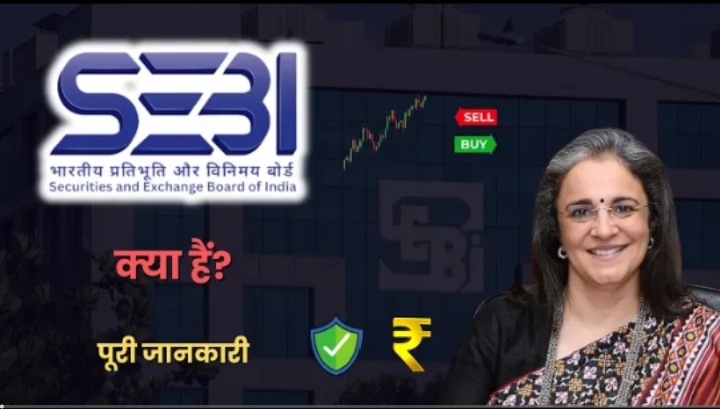Introduction
When I first heard about SEBI, I thought it was just another government body dealing with stocks and shares. But as I dug deeper, I realized how important it is for anyone investing in India. SEBI, or the Securities and Exchange Board of India, acts as a guardian for investors and ensures that the financial market runs smoothly and fairly.

This blog aims to simplify SEBI’s role, functions, and impact in a way that feels like a conversation, not a lecture. Let’s dive into it together.
What is SEBI?
SEBI, short for the Securities and Exchange Board of India, is a regulatory body established in 1988 and given statutory powers in 1992 through the SEBI Act. Think of SEBI as the watchdog of the financial markets in India. Its job is to protect investors, promote transparency, and ensure that companies and intermediaries (like brokers) play fair.
If you’ve ever invested in stocks or mutual funds, SEBI’s rules and guidelines are what make the process safe and structured for you.
Why Was SEBI Created?
Before SEBI, the Indian stock market was like an unmonitored playground where fraudulent practices were common. Scams, insider trading, and price manipulation made investing risky for the common man. SEBI was introduced to bring order to this chaos.
It was created with three main goals:
- Protecting Investors: Ensuring that people like you and me can invest without fear of scams.
- Regulating the Market: Setting rules to prevent fraud and malpractice.
- Developing the Market: Making investing easier and more accessible.
How SEBI Works: Key Functions
SEBI has a lot on its plate, but its work can be broken down into three primary functions:
- Regulation
SEBI creates rules for everyone involved in the financial market, including:
Stock exchanges (like NSE and BSE)
Brokers and intermediaries
Mutual fund houses
Example: If a company wants to list its shares on the stock market, SEBI ensures it provides accurate information to potential investors.
- Supervision
SEBI monitors activities in the market to catch any suspicious or illegal practices.
Example: Insider trading—when someone uses confidential information to make profits—is strictly prohibited under SEBI’s watch. - Education and Awareness
SEBI also works to educate investors. They regularly publish materials and conduct workshops to help people understand financial markets better.
Example: Ever read the disclaimer, “Mutual funds are subject to market risks”? That’s SEBI ensuring you’re aware of the risks before investing.
Key Powers and Responsibilities of SEBI
SEBI has the authority to:
- Impose Penalties: If someone breaks market rules, SEBI can fine them heavily.
- Suspend Trading: If a stock exchange isn’t operating fairly, SEBI can step in and halt trading.
- Investigate Frauds: SEBI has the power to conduct investigations into fraud and insider trading.
- Approve IPOs: Every company launching an Initial Public Offering (IPO) must get SEBI’s approval.
Why SEBI Matters to You
Even if you’re not directly investing in stocks, SEBI impacts your financial life. Here’s how:
- Safety for Investors
Imagine investing your hard-earned money and losing it to a scam. SEBI’s rules ensure that such incidents are rare and punishable. - Transparency in the Market
SEBI makes sure companies disclose all relevant information. This transparency helps you make informed decisions. - Fair Play
SEBI ensures that no one—be it big corporations or wealthy investors—has an unfair advantage over small investors.
Real-Life Examples of SEBI’s Role
- Harshad Mehta Scam
You may have heard of the Harshad Mehta scam (popularized by the series Scam 1992). This was one of the key incidents that highlighted the need for stricter financial regulations, leading to SEBI’s empowerment. - Penalty on Insider Trading
Recently, SEBI fined several individuals for insider trading in a high-profile company’s shares. This action protected regular investors from unfair losses.
FAQs About SEBI
Q1. What is SEBI’s full form?
SEBI stands for Securities and Exchange Board of India.
Q2. Who controls SEBI?
SEBI operates independently but reports to the Ministry of Finance, Government of India.
Q3. Does SEBI regulate mutual funds?
Yes, SEBI oversees all mutual fund operations in India to ensure transparency and protect investors.
Q4. How does SEBI impact stock market trading?
SEBI creates rules and guidelines to ensure fair trading practices and prevent malpractices like insider trading and market manipulation.
Conclusion
SEBI might not be a household name, but its work affects millions of Indians every day. It’s the reason you can invest with confidence, knowing there’s a system in place to protect your interests.
Whether you’re new to investing or a seasoned pro, understanding SEBI’s role gives you a deeper appreciation of how India’s financial market operates. It’s not just about rules—it’s about creating a trustworthy environment where anyone can invest and grow.
As I’ve come to realize, SEBI isn’t just a regulator; it’s a shield that ensures the financial dreams of ordinary citizens are safe from exploitation.
Related Resources
Official SEBI Website
Beginner’s Guide to Stock Market Investing
Understanding Mutual Funds: A Quick Overview